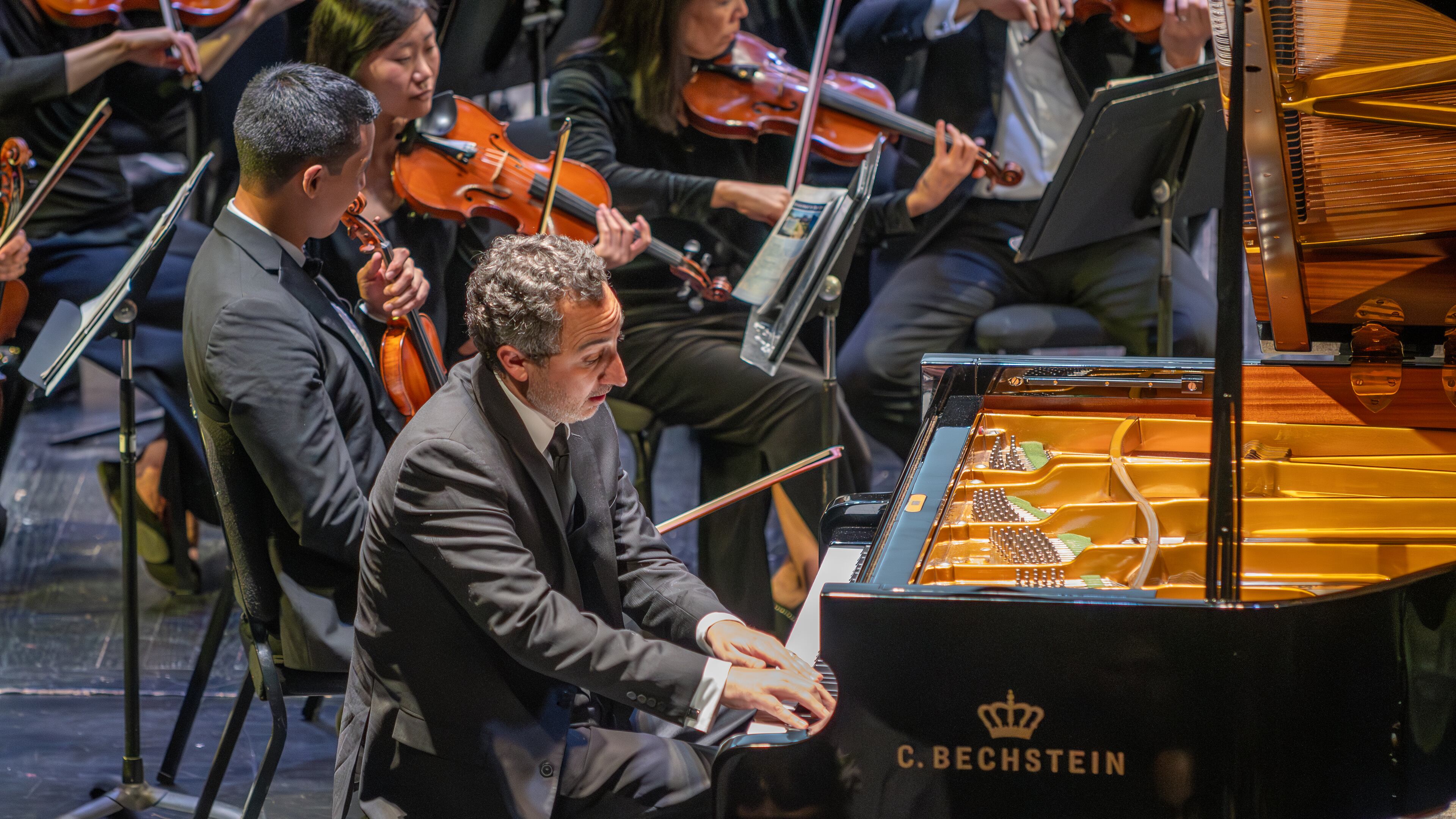Review: DeKalb Symphony leans into premiere, early 20th century favorites

This story was originally published by ArtsATL.
The DeKalb Symphony Orchestra (DSO) has been in fine form in the course of its 2023-24 season. Though not the sort of ensemble that produces standout soloists from within its ranks, the orchestra has made featured guest players a regular part of its concerts. An additional boon to the orchestra has been its ongoing cultivation of rising youth talent.
The DSO’s concert on Tuesday, May 14, saw that formula pay off yet again, though the results were mixed.
The evening opened with the overture to Jean Sibelius’ “Karelia,” followed by the Romanian folk dances of Béla Bartók. Both works played to the orchestra’s strength as purveyors of lighthearted whimsy. This is not an ensemble normally given to tackling requiems or other manifestations of the dark and ominous — and when they do, it usually strains their tonal balance.
The DSO players work best together when leaning into material with a whiff of modern orchestral nostalgia. Works like the evening’s selections from Sibelius and Bartók come from opposite sides of the turn of the 20th century, when classical stylings became the foundation for what would eventually become early Hollywood film soundtracks. It is that lush, blissful sound that comes to mind with the words “golden age.”

That proclivity toward the sonic escapism of the early 1900s worked well in the May 14 concert when the orchestra presented the world premiere of Charlie Zhong’s “Stilling Memory.”
A DeKalb Symphony commission, it had many of the hallmarks of the preceding works: a rich midrange ambience in the strings, delicate overtones from the winds and precise, nearly imperceptible, accentuations from the pitched percussion.
There was just one missing component — an engaging melody. Zhong has a reliable penchant for arrangements, and his soaring chords never failed to wash over the ears in a pleasing manner, but this work in its totality never seized on the potential that those arrangements offered.
It’s my eternal gripe with new classical works where the word “modern” is code for “no melody.”
Zhong’s program notes on the piece describe it as exploring “the convergence of conflicting things, whether internal or external.” That’s a worthy premise but one that would be better explored with the kind of dynamics that only the push and pull of an evolving melody can provide.
With clearly defined melodic phrasing, he could tug at the heartstrings like Samuel Barber or Edvard Grieg. If “Stilling Memory” is an indication of his style overall, his work would be best suited for classic Hollywood soundtracks. It’s easy to imagine something as ominous and atmospheric as the evening’s premiere serving as the soundtrack to a film noir like “Chinatown” or “The Maltese Falcon.”
Zhong is young — still in high school — and already he is a decorated veteran of the classical music competition circuit with prizes from the 2023 ASCAP Morton Gould Young Composer Awards, the 2021 National Young Composers Challenge and an honorable mention in the 2023 BMI Composer Awards, among many others. The adulation is certainly deserved; he’s already an arranger par excellence. Now he just needs to explore melody.
The evening’s guest soloist was pianist Alexander Wasserman, though appreciation of his performance was marred by overly familiar material.
Wasserman delivered a solid rendition of George Gershwin’s “Rhapsody in Blue,” a piece that for all its jazz/classical crossover charm is a well worn path for classical players and listeners alike.

Anyone who attends classical concerts regularly (your humble critic outstanding among them) will have heard the piece more times than they care to recall, and that lack of surprise serves to diminish the enjoyment of any performance.
The piano solo in “Rhapsody in Blue” is a series of embellishments on a set of repetitive motifs. Even in the hands of a solid and undeniably capable player such as Wasserman, the work is prone to sounding predictable and passe.
“Rhapsody in Blue” celebrated its 100th birthday in February, and throughout that century, controversy raged about the nature of the composition: Is it a work of enduring genius that smoothly melds the disparate worlds of jazz and classical? Or is it a tedious exercise in cheesy banality that relies on awkwardly stamping out basic principles of the two genres to the benefit of neither? No answers were forthcoming — or expected — from Wasserman’s performance, but the audience clearly appreciated it.
Wasserman closed out the evening with an encore: Claude Debussy’s “Clair de Lune.” There was more soul in that work, and it gave him an opportunity to break free of what some would consider Gershwin’s stultifying shackles.
The DeKalb Symphony Orchestra has found a new sense of vitality and a fuller, more cohesive sound under the command of maestro Paul Bhasin. It has also found its niche on the brighter end of the classical spectrum. May it continue to bring out its fullest potential.
::
Jordan Owen began writing about music professionally at age 16 in Oxford, Mississippi. A 2006 graduate of the Berklee College of Music, he is a professional guitarist, bandleader and composer. He is currently the lead guitarist for the jazz group Other Strangers, the power metal band Axis of Empires and the melodic death/thrash metal band Century Spawn.

MEET OUR PARTNER
ArtsATL (artsatl.org) is a nonprofit organization that plays a critical role in educating and informing audiences about metro Atlanta’s arts and culture. ArtsATL, founded in 2009, helps build a sustainable arts community contributing to the economic and cultural health of the city.
If you have any questions about this partnership or others, please contact Senior Manager of Partnerships Nicole Williams at nicole.williams@ajc.com.


